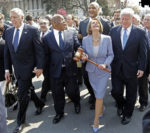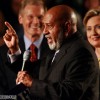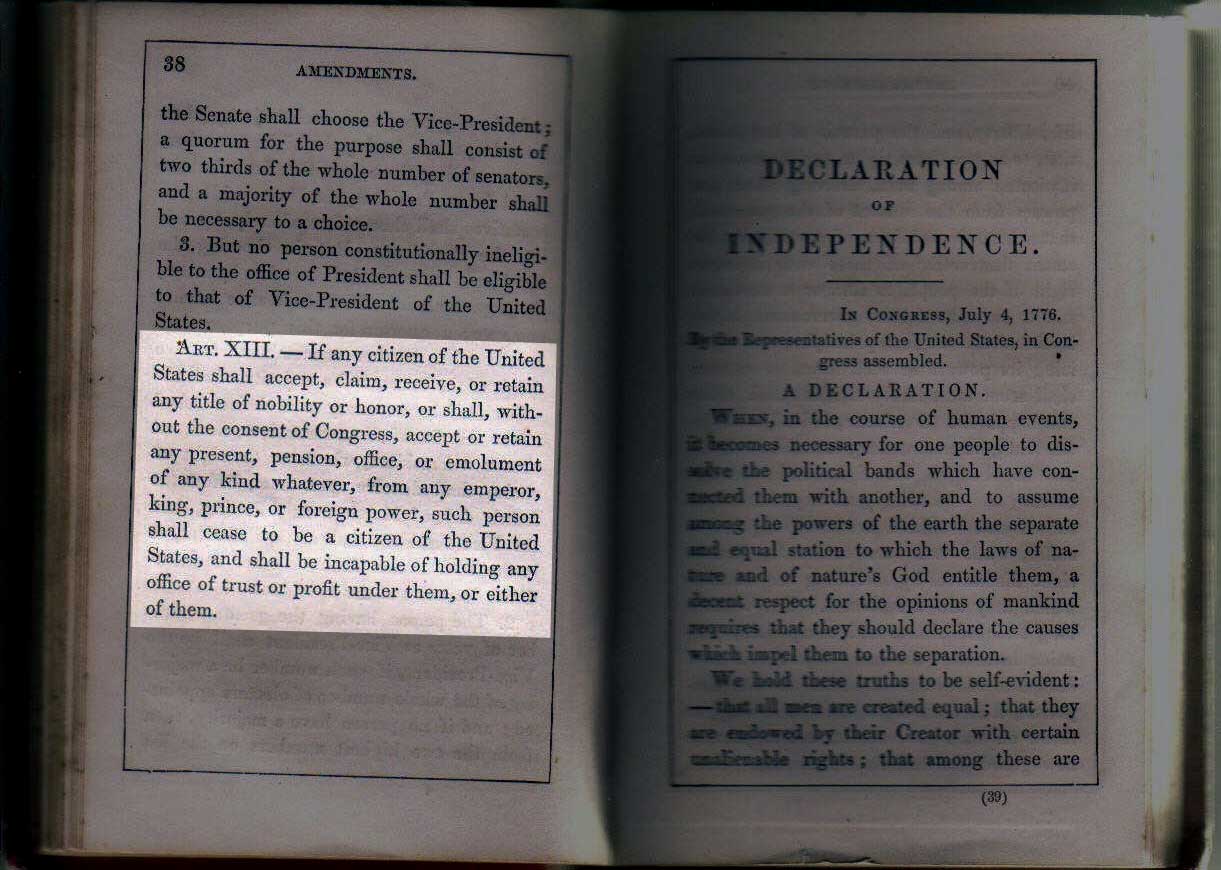 It’s amazing what so-called Constitutional scholars don’t talk about.
It’s amazing what so-called Constitutional scholars don’t talk about.
Imagine a United States government that wasn’t infected by Clintons or an Obama. How would the nation morph from slavery to freedom without a Lincoln? Like people in general, there are good, there are some who aren’t and the Founders knew it.
While many enthusiastically misinterpret the line from William Shakespeare’s Henry the Sixth, “The first thing we do, let’s kill all the lawyers”, there’s always been a suspicion when it comes to the self-serving motivations of those in the profession. Consider part of the 13th Amendment to the United States Constitution that is curiously missing.
In the winter of 1983, archival research expert David Dodge, and former Baltimore police investigator Tom Dunn, were searching for evidence of government corruption in public records stored in the Belfast Library on the coast of Maine.
 By chance, they discovered the library’s oldest authentic copy of the Constitution of the United States (printed in 1825). Both men were stunned to see this document included a 13th Amendment that no longer appears on current copies of the Constitution. Moreover, after studying the Amendment’s language and historical context, they realized the principle intent of this “missing” 13th Amendment was to prohibit lawyers from serving in government. In June of this year (1991), Dodge uncovered the evidence that this missing 13th Amendment had indeed been lawfully ratified by the state of Virginia and was therefore an authentic Amendment to the American Constitution.
By chance, they discovered the library’s oldest authentic copy of the Constitution of the United States (printed in 1825). Both men were stunned to see this document included a 13th Amendment that no longer appears on current copies of the Constitution. Moreover, after studying the Amendment’s language and historical context, they realized the principle intent of this “missing” 13th Amendment was to prohibit lawyers from serving in government. In June of this year (1991), Dodge uncovered the evidence that this missing 13th Amendment had indeed been lawfully ratified by the state of Virginia and was therefore an authentic Amendment to the American Constitution.
Kinda’ makes one wonder who removed it and why….
If the evidence is correct and no logical errors have been made, a 13th Amendment restricting lawyers from serving in government was ratified in 1819 and removed from US Constitution during the tumult of the Civil War. Since the Amendment was never lawfully repealed, it is still the Law today. The implications are enormous.
— The Missing 13th Amendment
Today, the idea of a constitutional controversy about the royals may seem kind of silly, but in 1812, the United States was fighting the British and had a rocky relationship with France. The fear of both nations using noble titles as bribes, along with pensions from a foreign government, was persistent. And both the Senate and the House easily passed the “Titles of Nobility Amendment” and passed it on to the states. By late 1812, a total of 12 states had approved the 13th Amendment and ironically, it needed a 13th state to become ratified. As the War of 1812 escalated, the TONA faded away as an issue and was never ratified.
— Constitution Center, 12/6/16
The “nobles” and “royals” in question were lawyers or those who could afford their services, and there didn’t seem to be much love for them. All you need do look at recent events to invoke memories of stories where lawyers always tend to take more care of themselves than their clients.
 Yahoo will pay up to $85 million to settle a class action lawsuit over its massive data breach, reports the Recorder, a legal publication. That includes $50 million for compensation for up to 200 million affected users plus another $35 million for lawyers’ fees and expenses. People who already have credit monitoring and certify they plan to keep it for at least a year would be eligible for $100, according to the settlement.
Yahoo will pay up to $85 million to settle a class action lawsuit over its massive data breach, reports the Recorder, a legal publication. That includes $50 million for compensation for up to 200 million affected users plus another $35 million for lawyers’ fees and expenses. People who already have credit monitoring and certify they plan to keep it for at least a year would be eligible for $100, according to the settlement.
— Fast Company, 10/24/18
So, why would the Founding Fathers and their predecessors be so wary of those in the law profession?
In Colonial America, attorneys trained attorneys but most held no “title of nobility” or “honor”. There was no requirement that one be a lawyer to hold the position of district attorney, attorney general, or judge; a citizen’s “counsel of choice” was not restricted to a lawyer; there were no state or national bar associations. The only organization that certified lawyers was the International Bar Association (IBA), chartered by the King of England, headquartered in London, and closely associated with the international banking system. Lawyers admitted to the IBA received the rank “Esquire” — a “title of nobility”.
“Esquire”; a title many lawyers today bestow upon themselves simply because… they’re lawyers.
Any lawyer can take on the title esquire, regardless of what type of law they practice. Family lawyers, personal injury attorneys, and corporate lawyers all have the right to use esquire as a title. As a title, esquire, meaning shield bearer, originated in Great Britain and France as a term of nobility in the Middle Ages. It applied to the squire of a knight, who hoped to acquire a noble rank as he rose to knighthood himself. In The United States, however, the constitution prohibits noble titles.
— Dolman Law Group
It hasn’t stopped them because they’re special.
“Esquire” was the principle title of nobility which the 13th Amendment sought to prohibit from the United States. Why? Because the loyalty of “Esquire” lawyers was suspect. Bankers and lawyers with an “Esquire” behind their names were agents of the monarchy, members of an organization whose principle purposes were political, not economic, and regarded with the same wariness that some people today reserve for members of the KGB or the CIA.
Article 1, Sect. 9 of the Constitution sought to prohibit the International Bar Association (or any other agency that granted titles of nobility) from operating in America. But the Constitution neglected to specify a penalty, so the prohibition was ignored, and agents of the monarchy continued to infiltrate and influence the government (as in the Jay Treaty and the US Bank charter incidents).
Therefore, a “title of nobility” amendment that specified a penalty (loss of citizenship) was proposed in 1789, and again in 1810. The meaning of the amendment is seen in its intent to prohibit persons having titles of nobility and loyalties to foreign governments and bankers from voting, holding public office, or using their skills to subvert the government.
— American History from Revolution to Reconstruction and Beyond
“Infiltrate” and “subvert”. Interesting choices of wording.
Now while our media, political class, and academia glorifies the profession (and don’t get us wrong; there ARE some good lawyers out there), not all during the early colonial days were enamored by those who practiced.
 The [Plymouth] colony’s first trained lawyer, Thomas Lechford, did little to instill enthusiasm. He was disbarred for trying to influence a jury. Anti-lawyer sentiment was pervasive elsewhere as well, and the “ancient English prejudice against lawyers secured new strength in America.” The framers of the Fundamental Constitutions of the Carolinas in 1669 declared it a “base and vile thing to plead for money or reward.” Connecticut and Virginia during a portion of the seventeenth century prohibited lawyers from practicing. Early lawyers were often laymen helping friends or women serving the legal interests of absent husbands.
The [Plymouth] colony’s first trained lawyer, Thomas Lechford, did little to instill enthusiasm. He was disbarred for trying to influence a jury. Anti-lawyer sentiment was pervasive elsewhere as well, and the “ancient English prejudice against lawyers secured new strength in America.” The framers of the Fundamental Constitutions of the Carolinas in 1669 declared it a “base and vile thing to plead for money or reward.” Connecticut and Virginia during a portion of the seventeenth century prohibited lawyers from practicing. Early lawyers were often laymen helping friends or women serving the legal interests of absent husbands.
— Kermit L. Hall, The Magic Mirror: Law in American History
In fact, arguments have been made against any lawyer being able to hold public office… ever.
What follows is a case to Amend the Constitution to Prohibit Lawyers from holding elective public office. The Amendment shall read:
No Person who holds, or has held, a license to practice law; nor any person who has represented any entity (other than himself) in a court of law in these United States, may be elected to any public office.
 What a wonderful world this would be….
What a wonderful world this would be….
— Herb Alpert, Lou Adler, Sam Cooke
Note the language in almost any piece of legislation written in “legalese” and then “nonprofit” entities like the ACLU, Southern Poverty Law Center, etc. (intentionally structured so they don’t pay taxes) that sue the government to prevent enactment of laws passed by the people’s representatives they don’t approve of.
 Meanwhile, elite colleges and universities churn out more and more lawyers, many advertise on television seeking customers to pile onto class action suits like the one against Yahoo!, where they reserve the bulk of settlements for themselves and the remaining change for their clients. While the media is lauding the fact that less than 40% of Congress today are lawyers, that’s still an impressive representation of those whose early instincts were how to deceive a jury and free those who were clearly guilty, shield the elite from the ramifications all of us would face, target businesses with suits that can result in opulent rewards for themselves, and while in office, write legislation complete with loopholes that can financially help friends and harm enemies.
Meanwhile, elite colleges and universities churn out more and more lawyers, many advertise on television seeking customers to pile onto class action suits like the one against Yahoo!, where they reserve the bulk of settlements for themselves and the remaining change for their clients. While the media is lauding the fact that less than 40% of Congress today are lawyers, that’s still an impressive representation of those whose early instincts were how to deceive a jury and free those who were clearly guilty, shield the elite from the ramifications all of us would face, target businesses with suits that can result in opulent rewards for themselves, and while in office, write legislation complete with loopholes that can financially help friends and harm enemies.
 Back when President Obama was implementing Obamacare, his spokesman promised, “Members of Congress will not receive anything that is not available to the public.” Indeed, Obamacare explicitly requires Congress to live under the same rules as everyone else, by kicking members and staff out of the Federal Employees’ Health Benefits Program and leaving them to enroll in health insurance through the law’s exchanges. Contrary to assurances and in violation of federal law, the Obama administration shielded lawmakers by granting Congress several types of special treatment unavailable to the public. Obama took these steps because he knew Congress would have quickly revamped or even repealed Obamacare if lawmakers had to live under its terms.
Back when President Obama was implementing Obamacare, his spokesman promised, “Members of Congress will not receive anything that is not available to the public.” Indeed, Obamacare explicitly requires Congress to live under the same rules as everyone else, by kicking members and staff out of the Federal Employees’ Health Benefits Program and leaving them to enroll in health insurance through the law’s exchanges. Contrary to assurances and in violation of federal law, the Obama administration shielded lawmakers by granting Congress several types of special treatment unavailable to the public. Obama took these steps because he knew Congress would have quickly revamped or even repealed Obamacare if lawmakers had to live under its terms.
— Washington Examiner, 9/5/17
Bad lawyers can become judges; obviously also problematic. Way too many judge wannabes are all too willing to throw the innocent in jail in favor of their potential lucrative and powerful upward mobility.
 The New England Center for Investigative Reporting found no case in Massachusetts where a prosecutor was disbarred for professional misconduct since 1974, when the state Board of Bar Overseers was created to hear complaints against attorneys. Only two public reprimands for professional misconduct were found in that 42-year span, and they came without fines or other punishment.
The New England Center for Investigative Reporting found no case in Massachusetts where a prosecutor was disbarred for professional misconduct since 1974, when the state Board of Bar Overseers was created to hear complaints against attorneys. Only two public reprimands for professional misconduct were found in that 42-year span, and they came without fines or other punishment.
At least seven prosecutors whose behavior prompted courts to reverse convictions went on to higher posts. Some became judges and district attorneys.
— WGBH, 4/3/16
It’s also rare that judges face the music.
 U.S. District Judge Alcee L. Hastings was convicted by the Senate yesterday of engaging in a “corrupt conspiracy” to extort a $150,000 bribe in a case before him, marking the first time a federal official has been impeached, removed from office for a crime he had been acquitted of by a jury, and stripped the 53-year-old jurist of his lifetime, $89,500-a-year position.
U.S. District Judge Alcee L. Hastings was convicted by the Senate yesterday of engaging in a “corrupt conspiracy” to extort a $150,000 bribe in a case before him, marking the first time a federal official has been impeached, removed from office for a crime he had been acquitted of by a jury, and stripped the 53-year-old jurist of his lifetime, $89,500-a-year position.
— Washington Post, 10/21/89
Alcee Hastings is currently a United States Congressman.
The 45th president, Donald J. Trump, is NOT a lawyer, achieving more than those who’ve preceded him and cashed-in on their prior service, and look at how those with that oh-so-important legal pedigree are taking offense to his many successes that diminish their worth.
The bottom line is, according to the United States Constitution, there should be NO lawyers on Capitol Hill or any state or local government.
Government was meant to be run by the people, using verbiage and common sense that shouldn’t require legalese to decipher. Obviously lawyers would sue us all if their existence today in government was threatened but do you really think they could muster enough states to amend the Constitution?
Let’s hope one day we find out.



Leave a Reply